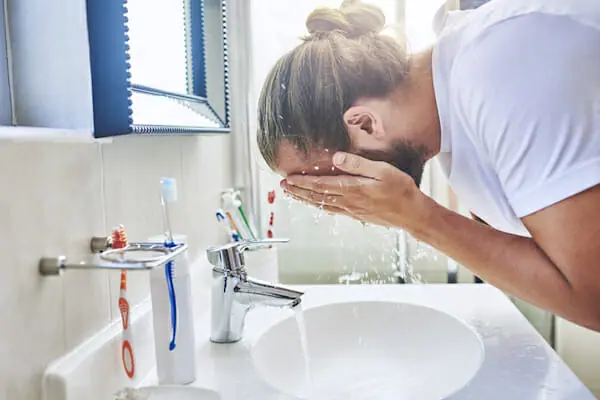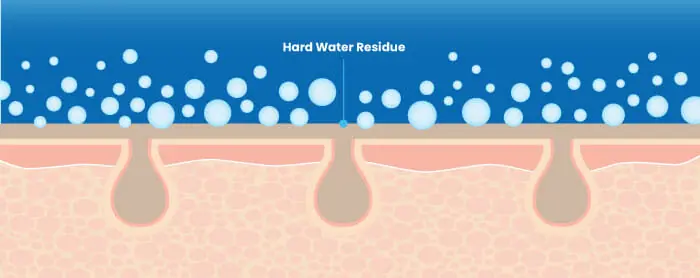
How does your skin feel after you step out of the shower? If you reside outside of Arizona, chances are you would reply, “clean and smooth.” On the other hand, if you are new to the state, your response will more likely be that it’s dry, itchy, or irritated.
This description is especially true for those who suffer from skin conditions such as atopic eczema (dermatitis), acne, and rosacea, among others. While you may assume the changes in your skin are related to the lack of humidity in Arizona, they are most likely caused by hard water in your home.
Because Arizona ranks as one of the top states for water hardness, it is an issue you will need to address as a new resident. A closer look at hard water can reveal steps to help eliminate troubles with your skin. Let’s dive in.
What Makes Water Hard?
According to the United States Geology Survey (USGS), “water hardness is based on major-ion chemistry concentrations.” More specifically, the amount of dissolved calcium and magnesium in the water determines its hardness level. The higher the volume of these two minerals, the harder the water.
The water supply to the Phoenix area is sourced from Lake Mead in Nevada along with mineral-enriched groundwater, which increases the levels of these minerals as the water travels into the metro area. Here’s a quick breakdown of each of these elements.

Naturally present in water, calcium can dissolve from rocks such as limestone and dolomite into water flows. It is the most abundant mineral in your body and is essential for humans and other living organisms.
Alkaline-earth metal magnesium is crucial to all cellular life, including plants and animals. Similar to calcium, this mineral is naturally found in waters around the globe and plays a role in water hardness.
While both minerals are essential to your health, when combined, high levels of these elements in water can cause scale to build up and damage your home’s pipes along with other fixtures such as showerheads and water heaters. This effect is the result of heating hard water, which creates white, chalky, calcium carbonate deposits — often referred to as limescale. You can observe this chemical reaction in any vessel you use to heat water, e.g., pans or tea kettles.
In addition to the build-up in pipework, you may notice a white film on your bathroom fixtures. Because of the calcium and magnesium union, hard water is unable to form a solution with soap and leaves behind a so-called “soap scum.”
What Does Hard Water Do to Skin?
Akin to the damage hard water can cause to your home’s plumbing, it can wreak havoc on your skin. Unlike the damage to your pipes, which often goes unnoticed until there is a reduction in water pressure, the effects of hard water on your skin are immediately apparent.
Just as hard water leaves a film or “soap scum” on your shower walls, it can leave a residue on your skin. Although signs of hard water such as dry, flaky, or itchy skin are visible, you may initially report feeling “squeaky clean” after bathing, only to find out later you have hard water.
Through sebaceous glands, your body produces and distributes a natural oil called sebum, which acts as your skin’s protective barrier against dryness. However, if you wash with hard water and soap, the combination can leave behind a film and clog your pores if not removed. This buildup can result in breakouts and further aggravate the most common skin condition in the United States: acne.

In addition to clogged pores, the soap residue might lead to the premature aging of your skin. Elements in hard water, including magnesium and iron form free radicals which are responsible for the breakdown of collagen in healthy skin cells. This loss of collagen results in sagginess, fine lines, and wrinkles.
Dr. Joshua Zeichner, a New York dermatologist, told Women’s Health magazine, “Hard water disrupts the skin’s barrier. Once the outer layer is compromised, it becomes inflamed and cannot protect itself.”
The consequences of this failure are evident for those who suffer from atopic eczema (dermatitis), psoriasis, rosacea, and other common skin issues. Evidence shows that as hard water strips your skin of its natural oils, it can cause excessive skin irritation and, in turn, cause these conditions to flare up. One recent NIH study demonstrated this association between bathing with hard water and an increased risk of atopic dermatitis.
How to Protect Skin from Hard Water
Even though hard water can be detrimental to your skin, there are several recommendations to help reduce or eliminate further damage. Here are a few you may want to consider.
Regularly moisturize your skin
“The use of a moisturizer after showering helps seal in moisture and rebuild the skin barrier,” according to Scottsdale dermatologist Dr. Jennifer T. Haley. The physician further notes it is essential you dab the water away from your skin rather than the traditional vigorous rubbing of the towel.
Use skin cleansers and soaps with hard water neutralizing glycerin
Because it is essential you keep your skin well-hydrated after showering, especially if you have a skin-drying condition, you will want to use a humectant-based wash. Formulas that contain glycerin (which attracts moisture) neutralize the components of hard water and reinforce your skin’s hydration.
Invest in a water softener
While moisturizers and glycerin-based cleansers both will help reduce hard water’s effect on your skin, the only method to eliminate any hard water issues is to install a water softener.
A water softening system performs an ion exchange that removes and replaces calcium and magnesium for sodium or potassium chloride, depending on the unit. This process will leave your skin feeling cleaner, free of residue, and help reduce and eliminate any dry-skin condition flare-ups.
In addition to the benefits for your skin, a water softener will protect your fixtures and appliances against “soap scum” and limescale buildup in your home’s pipes. Learn more about water softeners for Arizona homes.
Let Clear Water Concepts Help You Find the Right Solution
Due to the high levels of calcium and magnesium, any time you shower or bathe with hard water, you run the risk of ending up with dry, flaky, itchy skin. Those with an existing skin condition such as atopic eczema, rosacea, and acne may endure heightened irritation or outbreaks. A water softener is a solution to these many issues with hard water. The system removes skin-damaging minerals and “softens” the water which will help re-balance and protect your skin. Ask the Clear Water Concepts team about water softening solutions for your Arizona home.

